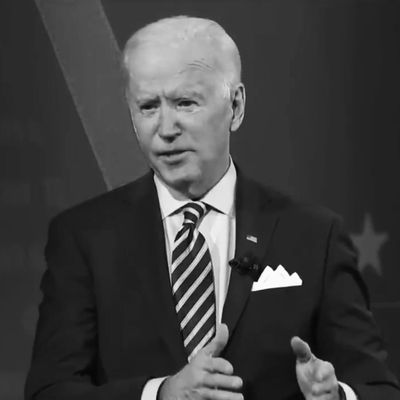
A Joe Biden quote I have trouble getting out of my head is this one: “Nothing will fundamentally change.” He reportedly said it to a bunch of wealthy donors at an event in New York in June 2019 in an attempt to reassure them that he would not “demonize” the rich. “No one’s standard of living will change,” he said. A few days prior, he had appeared at a Poor People’s Campaign presidential forum, where he said poverty was the No. 1 issue that could “bring the country down” and promised to enact policies to alleviate inequality. So which was it? Which vision would he offer to a country in a time of unprecedented crisis? Was he going to “build back better,” or was everything going to pretty much stay the same?
Biden’s defenders argued that speaking out of both sides of your mouth in this way is a necessary campaign tactic — he needed rich people to defeat Donald Trump. To Biden’s critics on the left, his comments exemplified his worst qualities as a candidate: his corporate-friendly politics and relationships, his aversion to real economic redistribution, and his refusal to back progressive policies that would truly help poor and marginalized communities. Fast forward a year and a half, and he’s already proving those critics right. In a town hall last night on CNN, Biden was asked about canceling student-loan debt up to $50,000 — a popular policy being proposed by a coalition of Establishment and progressive Democrats — and he shut the question down almost immediately. “I will not make that happen,” he said right away, arms crossed, seeming to take pride in the force of his opinion.
Biden went on to explain his refusal by parroting conservative talking points on debt cancellation. He said he didn’t want people who chose to go to private universities, “Harvard or Yale or Penn,” to get the same forgiveness as those who went to public universities — as if only privileged people attend these institutions. He said he intends to spend that money elsewhere, putting it toward early-childhood education, for example — as if those proposing the debt forgiveness want to take money from another cause. He touted his commitment to making four-year community college free and to eliminating $10,000 for those in debt — when the average amount of debt is $32,731. And he said he had the authority to cancel $10,000, “but not 50,” a claim that contradicts his own party’s view.
One reason Biden’s litany of misleading statements was so shocking is that the policy he was adamantly denying is not all that radical. In the Senate, the measure has been proposed by Senate Majority Leader Chuck Schumer and Senator Elizabeth Warren, with a companion bill in the House. They argue persuasively that eliminating $50,000 in debt for borrowers would help boost the economy, especially for Black Americans who carry much higher debt statistically than other groups. They lay out how Biden can use existing authority under the Higher Education Act to immediately cancel the debt (a power already deployed in small measure by the Trump administration’s own Education Department during the pandemic) and prevent the loan forgiveness from being taxed. As Warren puts it, “Data shows that canceling the student-loan debt would result in greater homeownership rates, more housing stability, improved credit scores, higher incomes, higher GDP, more small-business formation, and more jobs.” Nowhere does the plan say money would be taken from early-childhood education or other policy funding. The legislators argue there is room for both — a sentiment Biden echoed in 2019. “We have all the money we need to do it,” he said at the Poor People’s forum, speaking of getting every American access to health care and free college.
So the line Biden has drawn in the sand — that he somehow has a moral obligation to cancel $10,000 but not beyond that — seems all the more arbitrary and out of touch. His comments about Ivy League universities especially clash with what we know about student-debt holders. Black women have the most student-loan debt of any ethnic or racial group, according to the American Association of University Women. They end up with an average of $10,880 more in college debt than the average white male. That differential alone would only barely be covered by Biden’s $10,000 forgiveness proposal. Black and Latino Americans are then more likely to accrue huge amounts of interest and default on payments. It feels punitive and cruel to imply that lower-income students who choose to attend an elite institution with loans should be condemned to the crushing, ballooning pressure of debt — especially for those who made the choice because they thought it would improve their circumstances. “We were told that even though our families didn’t have much, if we took out loans we’d earn enough to pay them back,” Ashley Nicole Black said on Twitter. “Wages kept going down, and tuition kept going up, and no one did anything about those things but kept telling poor and middle class kids that.”
Biden is being presented with the opportunity to actually use the power of the federal government and the power of the presidency to drastically impact the lives of millions of people, and he is refusing to even consider it. And the reasoning he offers for doing so is disingenuous and out of step with the party that elected him.
When Schumer, Warren, and the House representatives backing their legislation announced their plans earlier this month, Representative Ayanna Pressley called on Biden to “be responsive to the movement that elected him.” At the time, Biden’s spokespeople said he was waiting for legislation to come from Congress and was “reviewing whether there are any steps he can take through executive action.” I think we know the answer now. There are steps he can take; he will not take them. That Biden, now in power with his party behind him, is choosing not to capitalize on this moment of unprecedented economic pain with a show of goodwill feels less like a misstep than a glimpse of his true priorities.


